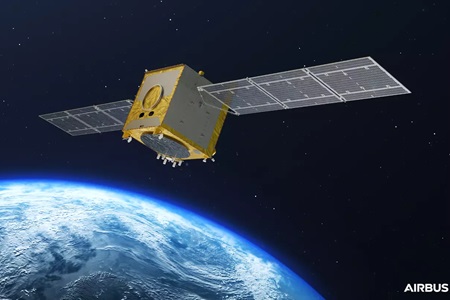The G2 satellites will incorporate enhanced navigation antennas which will help improve accuracy of the flagship European Global Navigation Satellite System.

Airbus has officially commenced full-scale production of the Galileo Second Generation (G2) satellites at its facility in Friedrichshafen, Germany. The initial satellite Flight Model structure, provided by Beyond Gravity in Zurich, has arrived, marking a significant milestone in the development of this cutting-edge satellite constellation. Following preliminary preparations, the satellite panels will be distributed to various Airbus sites for final integration and testing in Friedrichshafen. The launch of the Galileo G2 satellites is anticipated in the coming years to facilitate the initial deployment and validation of the G2 System.
Commenting on the development, Jean-Marc Nasr, Head of Space Systems at Airbus, said: After the successful design phase we are now kicking off production in earnest of the state-of-the-art Galileo G2 satellites. Our teams in Friedrichshafen are working with engineers across Europe to meet the challenging schedule and finalise these sophisticated satellites which will further improve the global Galileo system opening up even more opportunities for services on Earth.
To meet the demanding timeline of delivering all six satellites in less than two years, Airbus has implemented a coordinated production programme involving expertise from various Airbus sites, including Backnang (near Stuttgart), Friedrichshafen, Madrid, Ottobrunn (near Munich), and Toulouse. The modular approach to manufacturing will see three G2 satellites produced simultaneously.
The Galileo G2 satellites will incorporate advanced navigation antennas to enhance the accuracy of the European Global Navigation Satellite System. Equipped with electric propulsion for the first time, higher-strength navigation antennas, and fully digital payloads, these spacecraft can be easily reconfigured in orbit to respond to evolving user needs with innovative signals and services.
ESA’s Director of Navigation Javier Benedicto added: This new milestone is a testament to the capabilities and dedication of the European industry and reaffirms ESAs commitment to redefine the boundaries of satellite navigation. I cannot wait to see the many parts come together to bring to life an even better performing Galileo system, so this EU programme can continue serving European and world citizens.
The G2 satellites, each weighing above two tons and benefiting from Airbus heritage of reliable Eurostar series satellites, will feature six enhanced atomic clocks, inter-satellite links, and advanced jamming and spoofing protection mechanisms. These elements aim to provide decimeter-scale precision positioning globally. The satellites are designed to operate in orbit for a period of 15 years.
The Full Operational Capability phase of the Galileo programme is managed and funded by the European Union. ESA, in an agreement with the European Commission, acts as the design authority and system development prime on behalf of the Commission. The Galileo programme signifies a significant advancement in satellite navigation, showcasing European industry leadership and commitment to technological innovation.
















































































